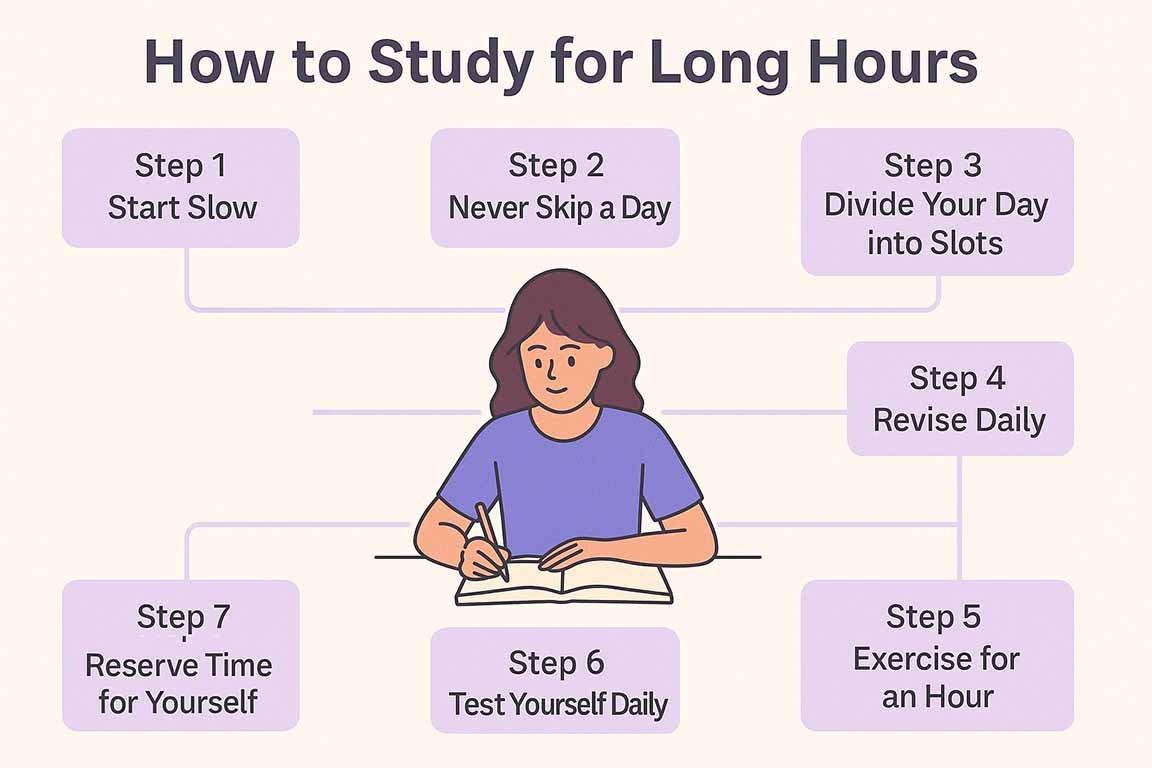Hi friends, in this post, we will understand how to study for long hours.
Introduction to Effective Study Habits
If you’re reading this blog post, you’re likely a student preparing for a challenging exam. You want to study for long hours but find it difficult to maintain.
When I began preparing for a competitive exam, I had the chance to speak with a successful candidate who had cleared a tough exam. He was aiming for an even higher goal in his next attempt. After learning about my academic background and realizing I was an average student, he advised that, as a full-time student, I’d need to study 14–16 hours a day to succeed.
I wondered: is it humanly possible to study 16 hours every day for a year?
For highly competitive exams, where the stakes are high, studying for long hours daily is essential. But how can you create a sustainable routine to achieve this?
In this blog post, you’ll discover 7 steps to help you study for long hours for any exam. Let’s get started.
Read now: 7 effective study hacks for exam
Managing Your 24 Hours
Like everyone, you have 24 hours in a day. Let’s allocate 8 hours for sleep, as most health experts recommend this for optimal health. This leaves you with 16 hours.
Deduct 1 hour for involuntary activities like getting up, getting ready, breakfast, lunch, and dinner. Now you have 15 hours.
Add 1 more hour for unforeseen circumstances, which may or may not occur. That leaves you with 14 hours daily.
If you’re studying full-time, you have 14 hours to work with. What’s the most practical way to use these hours?
Focus on Quality, Not Just Hours
Your success isn’t measured by how many hours you study but by how well you revise and retrieve information when it matters. Alongside studying, revision and practicing past questions are crucial. Let’s explore a practical way to spend your available hours.
Step 1: Start Slow
Don’t be overwhelmed by the number 14. Begin with 6 hours of study daily and gradually increase. It’s not mandatory to study 14 hours a day, but studying every day is essential. Make daily study a habit. Slowly increase to 8 or even 10 hours, but consistency is key.
Step 2: Never Skip a Day
If you miss a day, never skip twice. Missing once is an accident; missing twice starts a bad habit. If you have a bad day, compensate the next day by studying extra hours. Never break the chain. Create a planner and mark days when you study at least 6 hours.
Step 3: Divide Your Day into Slots
To study 10 hours a day, divide your day into three 3-hour slots plus one for revision. Alternatively, use four 2-hour slots and one for revision. There’s no fixed rule—find what works for you.
Step 4: Revise Daily
A car with a full fuel tank is useless if it can’t move. Studying is input, but retrieving information is the output. If you can’t recall what you’ve studied, long hours or bulky materials are pointless. Revise 1–2 hours daily. Try the retrieval method: before bed, take a blank sheet and write down everything you recall from that day’s study. Do this every day.
Step 5: Exercise for an Hour
Get your heart rate above 120 at least once daily. Walk, run, climb stairs, or jump rope, but never skip exercise. Exam preparation can lead to lifestyle diseases. To sustain your study routine without harming your health, engage in physical activity. Exercise boosts energy, helps you start fresh, and keeps you healthy long-term. You don’t need a gym or membership—just elevate your heart rate with any physical activity. While it doesn’t add to study hours, it ensures consistent and sustainable preparation by recharging your energy.
Step 6: Test Yourself Daily
Since you’re preparing for an exam, align your study with its requirements. Test yourself for 1–2 hours daily with past papers or mock tests, separate from your study slots. This makes your preparation exam-oriented, helping you understand the exam’s demands and focus areas.
Step 7: Reserve Time for Yourself
Set aside 2 hours daily for yourself. Use this time for meditation, exercise, or pursuing a hobby you enjoy. This acts as a reward, keeping you motivated.
Building a Sustainable Routine
The goal isn’t to study 16 hours a day. Instead, focus on:
- Studying consistently.
- Keeping your mind and body healthy.
- Making your preparation exam-oriented.
- Revising daily.
If you want to increase study hours, do so gradually. Starting too ambitiously can lead to burnout, causing you to abandon your goals.
For example, begin with 6 hours of study, 2 hours of revision, and 2 hours analyzing past papers—totaling 10 hours, a solid starting point. After a month, increase hours and replace analysis with solving past papers or mocks.
Aim to make this routine sustainable for a year or two. The objective is not to study 16 hours daily but to study long hours consistently while staying healthy and motivated.
Conclusion
I hope this blog post helps you build an effective study routine. Stay tuned for more tips to support your exam preparation journey!







